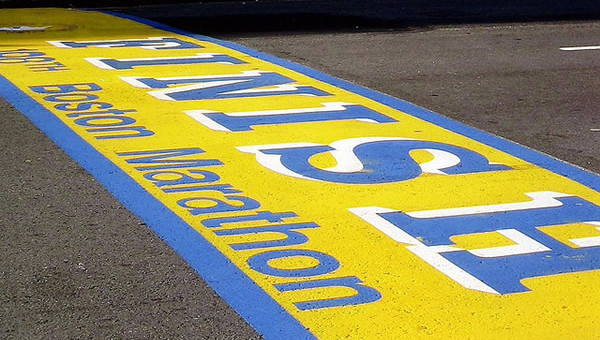Just over a year ago, I sat down after the Boston Marathon bombings and tried to make sense of the day. It was the darkest day in recent memory for Boston, but I hoped the city would not succumb to fear or anger. By the end of that week, after terrifying events that seemed pulled from a movie, one terrorist was dead and another in custody.
The response to the marathon bombing has been gratifying. Despite the desire of some, like senators Lindsey Graham and John McCain, Dzhokhar Tsarnaev was charged in a normal criminal proceeding. There’s been some handwringing about the order (actually a request) to lockdown Boston, but all except the most staunchly libertarian seem to feel it was warranted and did little harm. There will be increased security on Monday at this year’s marathon, but it seems to be limited to more barriers and checkpoints. Even the knucklehead who dropped suspicious packages at the finish line on Tuesday has not caused a panic.
The outpouring of support for and by Bostonians was tremendous. President Obama spoke after the attack, and Vice President Biden traveled to speak on the anniversary of last year’s events. Red Sox slugger David Ortiz declared “Nobody gonna dictate our freedom” – I’m still not sure what that means, but I love it anyway. Boston’s sports teams, long an integral part of the city, served as an outlet around which to rally. The Boston Globe and other local journalists provided quality breaking news coverage, and numerous stories about recovering and healing after the bombing. The Globe recently won a Pulitzer Prize for its reporting.
I’ve been surprised at how much the marathon bombing has dominated Boston’s consciousness in the last year. It’s worth thinking a little critically about why this is the case. The bombing was, to use an inelegant phrase, a media-friendly event. The capture of the terrorists was riveting. The loss of life was not so large as to leave the city and nation in a sustained shock, as was the case after September 11. There were individual acts and stories of recovery that provided hope. The motive of the terrorists may not have been completely clear, but it was easy paint them as “others” – immigrants who never fully integrated into an American way of life. The marathon bombing allowed a city to rally around the victims and around itself, without leaving everyone devastated.Compare this event to another recent tragedy: the Sandy Hook Elementary School shooting in Newtown. There has been an outpouring of grief and support for the Newtown community, including by the president and other leaders. But the Newtown massacre was perpetrated by a member of the community whose motivations are still unclear. The shooting forces us to ask tough questions, about complex topics like the mental health system and gun control. At least in the public policy arena, talk of the Newtown shooting and what could be done to prevent it faded quickly. The Red Sox wore a Newtown patch on opening day, and for several days after. The team wore its “Boston Strong” patch all year long.
This is a natural reaction – when pain is too great, the only way to cope is often to move on. And the victims and survivors of the marathon bombing deserve our praise. But this world is full of tragedies and outrages, both ongoing and momentary, at home and far away. We must make sure not to turn a blind eye to difficult events and questions, even in the service of something that seems good. As I wrote in my column a year ago: “Perspective is not always comforting, but it is important.”
